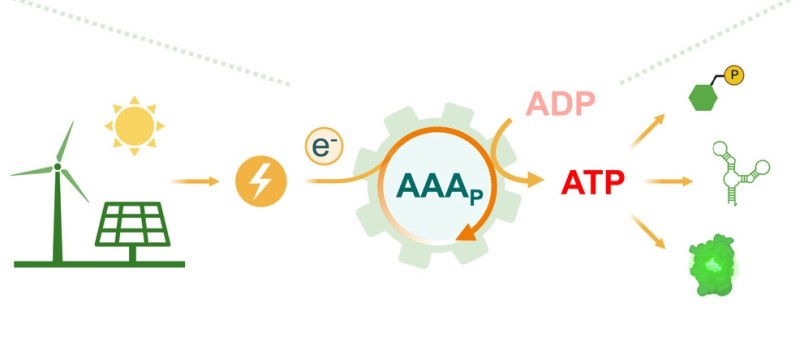We’ve all been there — you forgot your lunch, but there are AC outlets galore. Wouldn’t it be so much simpler if you could just plug in like your phone? Don’t try it yet, but biologists have taken us one step further to being able to fuel ourselves on those sweet, sweet electrons.
Using an “electrobiological module” of 3-4 enzymes, the amusingly named AAA (acid/aldehyde ATP) cycle regenerates ATP in biological systems directly from electricity. The process takes place at -0.6 V vs a standard hydrogen electrode (SHE), and is compatible with biological transcription/translation processes like “RNA and protein synthesis from DNA.”
The process isn’t dependent on any membranes to foul or more complicated sets of enzymes making it ideal for in vitro synthetic biology since you don’t have to worry about keeping as many components in an ideal environment. We’re particularly interested in how this might apply to DNA computing which we keep being promised will someday be the best thing since the transistor.
Maybe in the future we’ll all jack in instead of eating our daily food pill? If this all seems like something you’ve heard of before, but in reverse, maybe you’re thinking of microbial fuel cells.
















One step closer to becoming Borg!
I welcome our new hybrid overlords!
Came here to say exactly that: in sometime I will be able to have my own borg reneration pod!
Calm down. It’s not going to come with Jeri Ryan.
Zero discrimination, perfect world!
But isn’t ATP used inside the cell membranes?
The intention here is to power biological systems outside of a cell environment, because cellular systems might not be a good match for the engineering goals, since they spend so much energy on other processes.
I just want chloroplasts.
It would be highly inefficient, but it’s really not out of the realm of possibility, they are a captured organism like our mitochondria. The biggest issue would be the ethical concerns of testing to find a suitable genetic sequence to change, same as any genetic engineering, but I suspect that if you could hijack melanin production signals so that you tanned green.
The problem with that is how little energy you could get.
Even if you were naked, and spent every waking minute in mid-day sun levels of light covering 100% of your body, you wouldn’t get NEARLY enough energy.
Remember, photosynthesis is only 3-6% efficient, and the human body doesn’t cover much area.
I don’t like to post info without references, but I can’t find the source for this right now.
I remember reading that a whole day outside with exposed skin would photosynthesize less that 1 packet of sugar worth of biological energy. Something like 50-100 (kilo) calories.
Yup. The difference between animals and plants isn’t just “one uses the Sun, one uses food.” That reason why the niche for animals exists is because the power density available from food consumption is *significantly* larger than solar. The reason why plants don’t really move is because they don’t have the power available to do so.
You’re almost spot on in terms of scale: https://www.livescience.com/what-if-humans-had-green-skin-photosynthesis.html .
Is that a problem though? I agree you are not going to live of photosynthisis without vastly dropping your bodies energy demands or increasing the surface area, and probably both would be required. But if you have turned a previously unpleasant experience (not a sun lover) into one you gain a little more benefit from…
It doesn’t have to actually fuel you, and could be nothing more than giving you a small sugar and O2 high during the day as further reinforcement of the usual human circadian rhythm. Which would make those folks that work nights even more grumpy and hard doneby, but for most folks…
I shudder to think were we’ll stick the charger.
I’m sure it will need a dark, warm, moist location for optimum power transfer.
The biggest problem I see is that at least in the US, most food already has a much higher than optimal calorie to nutrient ratio. And thus an alternate source of calories would do nothing useful under normal conditions.
That said, the idea of a gadget to plug yourself into a solar panel or other power source for surviving starvation is a good one. Maybe more relevant for those who can eat a whole lot without gaining weight? Would they need a lot more electricity than average to run that gadget? (See Raina Huang for a famous example, she eats more in one meal than what most people eat in a whole day, while still being much skinnier than the average American.)
I dream the Satan bug Electric
https://www.livescience.com/technology/artificial-intelligence/chatgpt-moment-for-biology-ex-meta-scientists-develop-ai-that-creates-proteins-not-found-in-nature
It would be frightening to learn this could slow or even stop the aging process.
Although there are many who would like to live forever, that comes with its own set of problems.
I remember reading about how a cell is like a photocopy of a document, The more you copy the copy,
the more the finer details are lost. I wonder if that is still true with today’s modern equipment.
Imagine if we could adapt ourselves to live purely on electricity. You think the power grid is strained now,
wait until you hook up 8 billion people to it.
They where experimenting with the creation of amino acids from electricity in the 50’s to possibly prove how the building blocks of life could have been created in the universe. According to the research paper they have not yet established a working method for ATP… Hmmmmm
Another step on the road to androids.